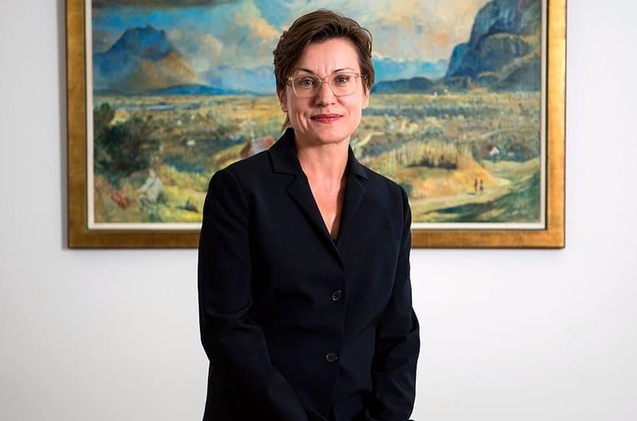
Mirjana Spoljaric was appointed Assistant Secretary-General and Assistant Administrator of the United Nations Development Programme (UNDP) in 2018. (Keystone)
When Antonio Guterres was elected United Nations Secretary General in 2016, some criticized the decision because they thought a woman should finally be at the helm of the international organisation. To his credit, Guterres has filled many of the UN’s top posts with women including Mirjana Spoljaric – Switzerland’s top ranking UN diplomat in New York.
From her corner office on the 16th floor of New York’s First Avenue, there is a direct view of the UN headquarters and the East River. However, the UN Assistant Secretary-Generalexternal link is not there often.
Especially since her 2,600 or so employees mostly work in the field: in Eastern Europe, the Caucasus and Central Asia. “In other words, in a region that is on the front lines of the former Cold War and is still dealing with the tensions of that time,” Mirjana Spoljaric says.
Spoljaric has to keep the balance in order to engage all of the powerful actors in the region. “Without good collaboration with the European Union, Russia and Turkey we can’t achieve anything and implement Agenda 2030.”
The fact that Spoljaric is Swiss played no role in her choice for the post. However, she credits her work as a Swiss diplomat with helping her gain key skills.
“In my almost 20 years in the Swiss diplomatic service, I have learned how important impartiality and objectivity are in dealing with countries. This neutrality is very useful to me now and it is appreciated.”
Focus areas
The countries that Spoljaric is responsible for are not among the poorest but are rather considered middle-income. “When we talk about poverty, we can’t just focus on the poorest countries in the world,” she explains.
In addition, due to poor governance, corruption or conflict, formerly wealthy countries can crash very quickly as seen in the cases of Zimbabwe, Syria and Iran.
Equal rights for women are central to the UN sustainable development goals. “We are unlikely to achieve the goals of Agenda 2030 if we don’t create equality for men and women.” Resistance remains strong and it is not restricted to a specific culture or religion.
New approach to development
Unlike the previous Millennium development goals, Agenda 2030 is not about wealthy northern countries paying for the development of poorer regions in the South.
“It is above all about helping the majority of countries raise the necessary funds themselves. That is the only way real sustainable development is possible,” Spoljaric argues.
The ambitious Sustainable Development Goals will not be achieved with classic development aid alone. The rest of the world needs to help tap sources of funding within existing structures or create new funding channels.
For example, there are ways for producing countries to receive more of the revenue from their raw materials including facilitating investment through better governance, developing a functioning tax regime, or ending illicit financial flows.
Spoljaric sees her main task and that of the UN Development Programme (UNDP) she heads as making this shift possible. According to an analysis by independent scientists appointed by the UN, there are many areas that are still not on track.
Agenda 2030
Agenda 2030external link includes 17 sustainable development goals and is the most ambitious development project that the UN has ever undertaken.
The UNDP which Mirjana Spoljaric now heads, doesn’t build wells or operate hospitals itself. It advises many governments about how they can achieve the goals and therefore maintains branches in 170 countries.
“What we at UNDP can offer concretely is accumulated knowledge from 170 countries. There are recipes for everything somewhere and at some point. And, we have seen what works and doesn’t work,” explains Spoljaric.
The UNDP also coordinates the activities of dozens of other UN agencies that support Agenda 2030.
end of infobox
Tags: Business,newsletter































